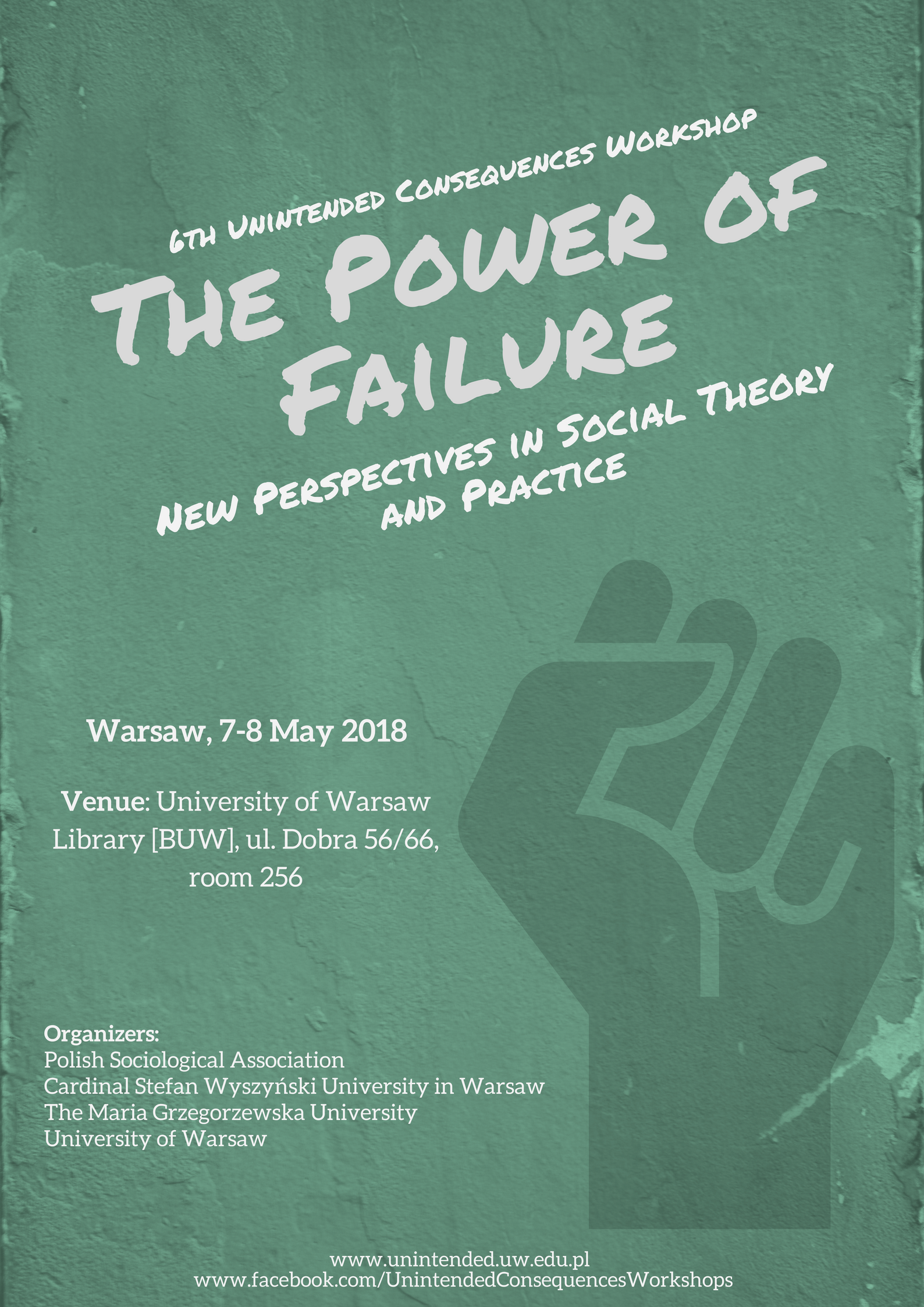The Power of Failure: New Perspectives in Social Theory and Practice
Warsaw 7-8 May 2018
Guest speakers
Paola de Vivo, University of Naples Federico II
Linsey McGoey, University of Essex
Call for Papers
The last decade crises, which emerged in such diverse domains as humanitarian, economic and political, challenged the sociological imagination to take up the phenomenon of failure and to give it a fresher look. Various issues were addressed, such as the possibility to predict failure, the modalities of coping with it, the attribution of responsibility, the dynamic of scapegoating, the reproduction of the institutional structures and power differential subsequent to episodes of crises and decline, and even the unexpected turning of failure into success in certain instances. The perspective changed accordingly from the micro level – wherein the dynamic of organizational and market failure was attentively scrutinized – to the macro level – in which the potential of these episodes of crisis and failure to effect the capitalist dynamics and the hierarchies of the globalized world was called into question.
All this sociological effervescence can be framed as, more or less consciously, spinning around the following major questions: Can failure be anticipated or predicted? What is the role of ignorance in rendering major episodes of crisis and public policy failure as unanticipated? What is the relation between failure and social change? In what conditions do episodes of failure effect social change? Even more, when is the social change so comprehensive that social actors consider that the episode or succession of failure/s unexpectedly resulted in success?
What renders these inquiries as sociologically ‘major’ is less the fact that they emerged in relation with episodes of crisis, but that these can, in fact, be addressed in relation to any domain or social activity, related or unrelated to the recently witnessed episodes of failure at a global scale. The power of failure to effect (or not) social change and to lead (or not) to success is an issue that goes beyond the visible manifestation of power games between major financial, political and economic actors. The power of failure concerns in fact the social life in its entirety. And although the major and spectacular episodes of failure and crisis are ‘needed’ in order to render this power obvious and to call attention to it, the fact of the matter is that the power of failure does not need such a grandiose arena to manifest.
For this reason, the Workshop proposes to depart from the conventional manner of discussing failure and the power of failure as something out of the ordinary and paradoxical, and to bring in contributions which deal with this topic in terms of everyday life and practice. The Workshop welcomes contributions dealing with such topics as:
- Sources and types of failure
- Possibility to predict failure
- Instituionalization and rhetoric of failure as something unanticipated and unexpected
- Recovery and coping mechanisms in practice
- Engagement in projects that involve high risk of failure
- Prophylactics and ignorance of failure
- Failure as stumbling block vs Failure as stepping stone to success
- From failure to success: everyday life and beyond
- Sociologists of failure, sociology of failure
- Analysis of failure and unintended consequences in social sciences
The Organizing Committee hopes the Workshop will contribute to the conceptual, theoretical and empirical enrichment of the studies on sociology of failure and recovery, it will create an apt platform for revisiting well established assumptions and paradigms, and help opening new research sites for empirical investigation.
The deadline for submission of abstracts is 15 December 2017.
More information is available HERE
Organizers:
Polish Sociological Association: Sociology of Law Section & Warsaw Department
Cardinal Stefan Wyszyński University in Warsaw: Institute of Sociology
The Maria Grzegorzewska University: Institute of Sociology and Philosophy
University of Warsaw: Institute of Applied Social Sciences



